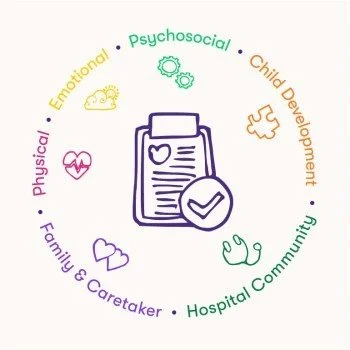Music as a Medium: Literature Review Confirms Positive Impact of Music on Hospitalized Patients Across Wellness Domains
A recent independent literature review by Karyl Askew Consulting proved what we’ve known all along at JoyRx: that music makes sick kids feel better. And not just emotionally — in addition to benefits for mood and mental well-being, music also decreases pain and anxiety. The impact is all-encompassing, benefiting the emotional, physical, psychosocial and developmental wellness of kids in treatment and improving the overall quality of life and hospital experience for patients, their families and even the hospital community itself.
Six Wellness Domains of Relevance to JoyRx Music – Positive impacts to • Physical • Emotional • Psychosocial • Child Development • Family and Caretaker • Hospital Community
Decreased Pain and Anxiety
Yates et al., (2018) concluded that the music interventions mitigated the physical and emotional challenges of medical procedures for the child across age groups and promoted both the caregivers and the child’s psychosocial wellbeing.
It’s common knowledge that music can have a powerful effect on mood — most of us have felt that at some point in our lives, by getting an uplifting boost from an uptempo beat or being struck with sadness, thoughtfulness or nostalgia while listening to a melancholy tune. Music can also be distracting — we listen to it to while away long hours on a road trip or for help with stamina during a hard workout.
Studies back this lived experience up with data. When nurses measured vital signs before and after music interventions, they were improved signaling decreased pain and anxiety. In one study, an interaction with a musician reduced distressed for young patients before, during and after medical procedure and relaxed tension in children with respiratory and cardiac issues, independent of age and gender. Another study showed also that just any distraction will do — interacting with a live musician is proven to be a more beneficial distraction during an ER procedure for children compared to watching cartoons.
Psychosocial and Developmental Benefits
Blackburn (2020) reports that interactive music interventions for children can focus on facilitating interpersonal processes such as interaction, verbalization, and educational outcomes for children within a hospital setting.
Being hospitalized as a child at any age is a major disruption to the ordinary course of life. It adds significant psychosocial stress on the entire family and can disrupt development that would normally take place as the child loses out on socialization opportunities. This loss may cause negative repercussions like development delays, depression, loss of identity, stress and anxiety, communication issues, and can change or end current relationships with peers and friends. Extended hospital stays also add significant psychosocial stress on the entire family.
The studies reviewed showed that music listening, composition and active engagement can positively impact psychosocial well-being as well as physiological development.
Families, Caregivers and Hospital Community
Hospitalization with life threatening illness or injury in an infant or child has a range of potential negative effects on families including financial issues, social supports, psychological health, family relationships, sibling wellbeing, and a disruption to parent-child attachments (McCarthy et al., 2016).
One study in the review involved interviews with caregivers for children hospitalized with cancer and receiving blood and marrow transplants. Based on the perceptions of the caretakers that music interventions motivated patients despite symptoms, elevated their moods, and they the caregivers also benefitted from and appreciated the interventions, the study concluded that music interventions promoted not only the child’s psychosocial well-being but also the caregivers and mitigated the physical and emotional challenges of major medical procedures.
Measuring Impact
This review is the first step in a multi-component study to measure the potential impact of JoyRx Music’s Digital-Live programming on the well-being of patients. You can read the full literature review here.


